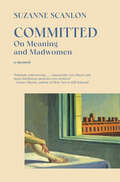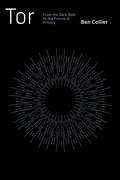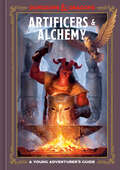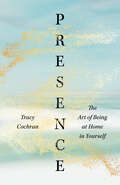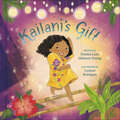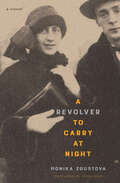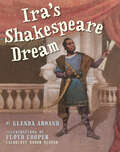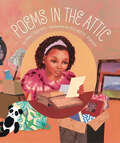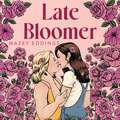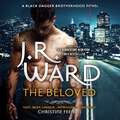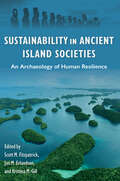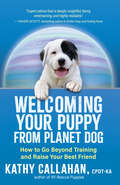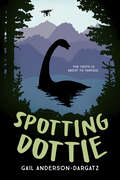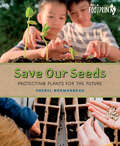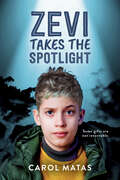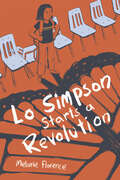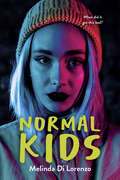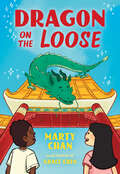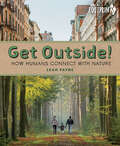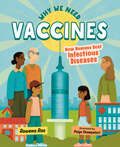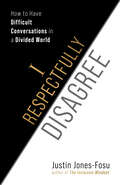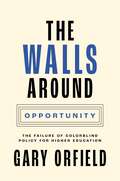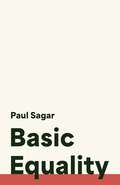- Table View
- List View
Committed: On Meaning and Madwomen
by Suzanne ScanlonA raw and masterful memoir about becoming a woman and going mad—and doing both at once. When Suzanne Scanlon was a student at Barnard in the 90s, grieving the loss of her mother—feeling untethered and swimming through inarticulable pain—she made a suicide attempt that landed her in the New York State Psychiatric Institute. After nearly three years and countless experimental treatments, Suzanne left the ward on shaky legs. In the decades it took her to recover from the experience, Suzanne came to understand her suffering as part of something larger: a long tradition of women whose complicated and compromised stories of self-actualization are reduced to &“crazy chick&” and &“madwoman&” narratives. It was a thrilling discovery, and she searched for more books, more woman writers, as the journey of her life converged with her journey through the literature that shaped her. Transporting, honest, and graceful, Committed is a story of discovery and recovery, reclaiming the idea of the madwoman as a template for insight and transcendence through the works of Charlotte Perkins Gilman, Virginia Woolf, Sylvia Plath, Janet Frame, Audre Lorde, Shulamith Firestone, and others.
Tor: From the Dark Web to the Future of Privacy
by Ben CollierA biography of Tor—a cultural and technological history of power, privacy, and global politics at the internet's core.Tor, one of the most important and misunderstood technologies of the digital age, is best known as the infrastructure underpinning the so-called Dark Web. But the real &“dark web,&” when it comes to Tor, is the hidden history brought to light in this book: where this complex and contested infrastructure came from, why it exists, and how it connects with global power in intricate and intimate ways. In Tor: From the Dark Web to the Future of Privacy, Ben Collier has written, in essence, a biography of Tor—a cultural and technological history of power, privacy, politics, and empire in the deepest reaches of the internet.The story of Tor begins in the 1990s with its creation by the US Navy&’s Naval Research Lab, from a convergence of different cultural worlds. Drawing on in-depth interviews with designers, developers, activists, and users, along with twenty years of mailing lists, design documents, reporting, and legal papers, Collier traces Tor&’s evolution from those early days to its current operation on the frontlines of global digital power—including the strange collaboration between US military scientists and a group of freewheeling hackers called the Cypherpunks. As Collier charts the rise and fall of three different cultures in Tor&’s diverse community—the engineers, the maintainers, and the activists, each with a distinct understanding of and vision for Tor—he reckons with Tor&’s complicated, changing relationship with contemporary US empire. Ultimately, the book reveals how different groups of users have repurposed Tor and built new technologies and worlds of their own around it, with profound implications for the future of the Internet.
Artificers & Alchemy: A Young Adventurer's Guide (Dungeons & Dragons Young Adventurer's Guides)
by Jim Zub Stacy King Official Dungeons & Dragons LicensedAn immersive, one-of-a-kind guide to the wondrous magical items and creatures of Dungeons & Dragons, the world&’s most beloved tabletop role-playing gameFeaturing amazing illustrations and expert insights, Artificers & Alchemy explores peculiar phenomena, sentient weapons, guardian gear, and the artificers who create these enchanted objects. If you&’re eager to start your own D&D adventures, this guidebook provides the perfect starting point to creating worlds of fantasy and weaving an epic story all your own.
Presence: The Art of Being at Home in Yourself
by Tracy CochranIn 20 short, gem-like chapters, meditation teacher Tracy Cochran invites us to explore living fully in the present moment as a revolutionary practice.Tracy&’s vibrant essays from her storied life give plenty of encouragement to reframe and dive deep into our own experiences.Mindfulness offers us a way to be fully in the present moment—and as we start to embrace this practice, we learn that our lives are made of present moments. That gift of presence is the palpable experience of awareness that appears when we remember to be mindful of those moments. In 20 short chapters, Cochran encourages us to see presence as a living force—and to recognize and explore how that shows up in our lives. She offers riveting and relatable stories from her life—a spiritually transformative wine-making trip in France, a near-death experience while being mugged, managing her feisty child while on a retreat with Thich Nhat Hanh, among many others—and Buddhist teachings to encourage us to see the power of presence to illuminate and transform our past, present, and future. Cochran's observations and reminiscences are wise and pithy, and she gives us plenty of encouragement to explore and reframe our own experiences.
Kailani's Gift
by Dorina Lazo Gilmore-YoungA picture book celebration of family, Filipino heritage, and dance that showcases the value of patience, perseverance, and blessing others with your gifts and talents.As Kailani watches her siblings practice a traditional Filipino dance for their grandparents' anniversary party, she longs to join them. But keeping up with the rhythm and hopping in time with the beats of the tinikling is much harder than Kailani imagined!With Daddy's help, Kailani practices the motions of the dance step by step. But will she be able to learn the tinikling in time to surprise her Lolo and Lola?Illustrator Lynnor Bontigao's work pairs exquisitely with Dorina Gilmore-Young's storytelling to celebrate Filipino culture and traditions. Also included is a glossary of Tagalog terms used throughout the book.
A Revolver to Carry at Night: A Novel
by Monika ZgustovaA captivating, nuanced portrait of the life of Véra Nabokov, who dedicated herself to advancing her husband&’s writing career, playing a vital role in the creation of his greatest works.Véra Nabokov (1902–1991) was in many ways the epitome of the wife of a great man: keenly aware of her husband&’s extraordinary talent, she decided to make his success her ultimate goal, throughout fifty-two years of marriage until his death in 1977. The first reader of his texts, Véra worked as typist and editor. She organized their lives in exile, as they traveled to Berlin, Paris, Switzerland, and, most importantly, the US, where she convinced Vladimir to focus on writing novels in English. She not only controlled the family&’s finances and contract negotiations, but also attempted to control his friendships—particularly with women—going so far as to audit his classes.In this rich, sweeping novel, Monika Zgustova immerses us in the daily life of this remarkable couple, offering insights into their complex personal and professional relationships, as well as the real people behind characters such as Lolita. Véra considered herself an independent woman, but was she really, when her husband took up so much space? And without Véra, could Nabokov have become one of the twentieth century&’s greatest writers?
Ira's Shakespeare Dream
by Glenda ArmandThe inspiring biography of Ira Aldridge, a Black actor who overcame racism to become one of the greatest Shakespearean actors of the nineteenth century.Ira Aldridge dreamed of being on stage one day and performing the great works of William Shakespeare. He spent every chance he had at the local theaters, memorizing each actor's lines. He knew he could be a great Shakespearean actor if only given the chance. But in the early 1800s, only white actors were allowed to perform Shakespeare. Ira's only option was to perform musical numbers at the all-black theater in New York city. Despite being discouraged by his teacher and father, Ira determinedly pursued his dream and set off to England, the land of Shakespeare. There, Ira honed his acting skills and eventually performed at the acclaimed Theatre Royal Haymarket. Through perseverance and determination, Ira became one of the most celebrated Shakespearean actors throughout Europe. Illustrated by award-winning artist Floyd Cooper, Ira's Shakespeare Dream is a captivating tribute to the inspiring life of Ira Aldridge, and to the renowned works of William Shakespeare.
Poems in the Attic
by Nikki GrimesAward-winning poet Nikki Grimes presents a tender poetry collection where a young girl learns about her mother, the child of an Air Force serviceman.During a visit to her grandma's house, a young girl discovers a box of poems in the attic, poems written by her mother when she was growing up. Her mother's family often moved around the United States and the world because her mother's father was in the Air Force. Over the years, her mother used poetry to record everything she saw and did in the many places their family lived. Reading the poems and sharing those experiences through her mother's eyes, the young girl feels closer to her mother than ever before. To let her mother know this, she creates a gift: a book with her own poems and copies of her mother's. And when she returns her mother's poems to the box in the attic, she leaves her own poems too, for someone else to find, someday. Using free verse for the young girl's poems and tanka for her mother's, master poet Nikki Grimes creates a tender intergenerational story that speaks to every child's need to hold onto special memories of home, no matter where that place might be.
Late Bloomer: The next swoony rom-com from the author of A BRUSH WITH LOVE!
by Mazey EddingsMazey Eddings' signature sparkling voice shines through in this sexy, sapphic, opposites-attract romance!'A magnificent story about queer joy, queer love, and the power of queer community . . . this book is a must-read' ALISON COCHRUNWinning the lottery ruined Opal Devlin's life. She may have been able to leave her dead-end job, but now she's getting endlessly bombarded with people knocking at her door for a handout . . . and she can't seem to stop saying yes.Opal realises she has a chance to follow her own dreams, and decides to spend almost all her new money on a failing flower farm in North Carolina where she can start her painting business. But her plans for isolation soon go hopelessly awry when an angry (albeit gorgeous) Pepper Boden is waiting for her at her new farm. Pepper states that she's the rightful owner of Thistle and Bloom Farms, and she isn't moving out.There's not much else they can do except strike up an agreement of co-habitation, but they're soon butting heads at every turn. While they each have a reason to stay, can these two opposites find a way to plant some roots? Or will their combustible arguing (and growing attraction) burn the whole place down?Amazing praise for Mazey Eddings:'So freaking cute. . .Tilly in Technicolor will have you aching with love for these characters while swooning at their awkward adorableness together. I want to hug this book to my chest' CHLOE GONG'Mazey Eddings's writing is authentic, emotional, and intensely romantic! To me, it's like a Taylor Swift song in book form' ALI HAZELWOOD'Blends sweetness, breathless romance, and moments of striking vulnerability' HELEN HOANG'Prepare to smile, laugh, and cry your way through this witty, fast-paced rom-com' EVIE DUNMORE'Laugh-out-loud funny, almost unbearably cute' ROSIE DANAN'A contemporary romance masterpiece . . . The most intoxicating slow burn I've read in ages' RACHEL LYNN SOLOMON'Funny and cute while also exploring serious topics, powerfully underscoring the truth that relationships require work, and that happy endings are for everyone' SARAH HOGLE'Brims with emotional depth, whip-smart banter, and sizzling chemistry' CHLOE LIESE
The Beloved (Black Dagger Brotherhood #22)
by J. R. WardThe daughter of a legend finds the love of a lifetime in this passionate, heart-wrenching instalment in J. R. Ward's #1 New York Times bestselling Black Dagger Brotherhood series . . .Nalla, the blooded daughter of Zsadist, has led a sheltered life. Protected by her father and the Brotherhood, kept away from the deadly war with the Lessening Society, she is chafing against the walls of the very safety that has ensured her survival. One night, she gives in to her restlessness . . . and finds herself face-to-face with a male whose inner darkness rivals even that of her sire's horrific origins. Nate is a fighter with nothing to lose-and nothing to live for. Tortured in a human lab as a young, then cursed with immortality, he is all vengeance and no purpose because he cares for no one-not even himself. The Brotherhood knows this all too well, and following Nate's deliberate violation of the cardinal rule in the war, they declare him a dangerous liability that must be dealt with. When Nalla and Nate find themselves fighting side by side, daggers aren't the only things that fly. A sizzling attraction is ignited, though Nalla knows her sire will never accept him-and on his side, Nate has made a secret bargain to end his own immortality. As the enemy closes in, and Nalla realizes she must choose between her mate and her sire, what starts with such passion may well end with eternal sorrow and no chance of a reunion-even in the Fade.Find out why readers are OBSESSED with the Black Dagger Brotherhood . . .'Insanely good! . . . Intensely romantic and straight up flipping steamy, violent and gruesome, heartbreaking and deep. Her addictive writing tells a story like none other' Goodreads reviewer''I can't get enough of these sexy, tough, intriguing vampires' Amazon reviewer'Emotional by epic proportions' Kobo reviewer'The Black Dagger Brotherhood is a twisting, often surprising, but always awesome read' Amazon reviewer'A must read' Goodreads reviewer'The story had me captivated the whole way' Kobo reviewer'Each and every character is compelling' Amazon reviewer
Sustainability in Ancient Island Societies: An Archaeology of Human Resilience (Society and Ecology in Island and Coastal Archaeology)
by Scott M. Fitzpatrick Jon M. Erlandson Kristina M. GillExamining dynamic interactions between humans and island environments This volume explores the impacts humans have made on island and coastal ecosystems and the ways these environments have adapted to anthropogenic changes over the course of millennia. Case studies highlight how island populations developed social and political strategies to effectively manage their ecosystems, ensuring the long-term survival of their societies and the persistence of their cultural traditions. In case studies from islands in the Pacific, the Caribbean, and the Atlantic, contributors apply resilience theory, historical ecology, niche construction theory, and human behavioral ecology to foreground Indigenous resiliency and sustainability. Modern island and coastal societies face daunting challenges in the decades to come, including climate change, sea level rise, and the loss of habitable lands and heritage resources. Sustainability in Ancient Island Societies argues that the study of past human responses to such changes, especially practices rooted in Indigenous traditional ecological knowledge, can inform solutions to manage these threats today.Contributors: Rebecca Boger | Emira Ibrahimpasic | Frederique Valentin | Stuart Bedford | Davide Marco Zori | William Jeffery | Denise Elena | Edith Gonzalez | Mark Horrocks | Anaëlle Jallon | Sophia Perdikaris | Iarowoi Philip | Takaronga Kuautonga | Lindsey E. Cochran | Christopher Wolff | Todd Braje | Craig Shapiro | Allison Bain | Dr. Torben C. Rick | James Flexner | Tim Denham | Jon M. Erlandson | Robert Williams | Victor D. Thompson | Scott M. Fitzpatrick | Julie Field | Kristina M. Gill | Sandrine Grouard A volume in the series Society and Ecology in Island and Coastal Archaeology, edited by Victor D. Thompson and Scott M. Fitzpatrick
Indigenous Archival Activism: Mohican Interventions in Public History and Memory
by Rose MironWho has the right to represent Native history? The past several decades have seen a massive shift in debates over who owns and has the right to tell Native American history and stories. For centuries, non-Native actors have collected, stolen, sequestered, and gained value from Native stories and documents, human remains, and sacred objects. However, thanks to the work of Native activists, Native history is now increasingly being repatriated back to the control of tribes and communities. Indigenous Archival Activism takes readers into the heart of these debates by tracing one tribe&’s fifty-year fight to recover and rewrite their history. Rose Miron tells the story of the Stockbridge-Munsee Mohican Nation and their Historical Committee, a group of mostly Mohican women who have been collecting and reorganizing historical materials since 1968. She shows how their work is exemplary of how tribal archives can be used strategically to shift how Native history is accessed, represented, written and, most importantly, controlled. Based on a more than decade-long reciprocal relationship with the Stockbridge-Munsee Mohican Nation, Miron&’s research and writing is shaped primarily by materials found in the tribal archive and ongoing conversations and input from the Stockbridge-Munsee Historical Committee. As a non-Mohican, Miron is careful to consider her own positionality and reflects on what it means for non-Native researchers and institutions to build reciprocal relationships with Indigenous nations in the context of academia and public history, offering a model both for tribes undertaking their own reclamation projects and for scholars looking to work with tribes in ethical ways.
Good Boys, Bad Hombres: The Racial Politics of Mentoring Latino Boys in Schools
by Michael V SinghThe unintended consequences of youth empowerment programs for Latino boys Educational research has long documented the politics of punishment for boys and young men of color in schools—but what about the politics of empowerment and inclusion? In Good Boys, Bad Hombres, Michael V. Singh focuses on this aspect of youth control in schools, asking on whose terms a positive Latino manhood gets to be envisioned. Based on two years of ethnographic research in an urban school district in California, Good Boys, Bad Hombres examines Latino Male Success, a school-based mentorship program for Latino boys. Instead of attempting to shape these boys&’ lives through the threat of punishment, the program aims to provide an &“invitation to a respectable and productive masculinity&” framed as being rooted in traditional Latinx signifiers of manhood. Singh argues, however, that the promotion of this aspirational form of Latino masculinity is rooted in neoliberal multiculturalism, heteropatriarchy, and anti-Blackness, and that even such empowerment programs can unintentionally reproduce attitudes that paint Latino boys as problematic and in need of control and containment. An insightful gender analysis, Good Boys, Bad Hombres sheds light on how mentorship is a reaction to the alleged crisis of Latino boys and is governed by the perceived remedies of the neoliberal state. Documenting the ways Latino men and boys resist the politics of neoliberal empowerment for new visions of justice, Singh works to deconstruct male empowerment, arguing that new narratives and practices—beyond patriarchal redemption—are necessary for a reimagining of Latino manhood in schools and beyond.
Welcoming Your Puppy from Planet Dog: How to Go Beyond Training and Raise Your Best Friend
by Kathy CallahanWritten in a fresh, warm voice loaded with empathy, Welcoming Your Puppy from Planet Dog lights the path to a relaxed, happy interspecies household “Expert advice that is deeply insightful, funny, entertaining, and highly relatable.” — Traer Scott, bestselling author of Shelter Dogs and Finding Home After a decade of guiding people who’ve just added a puppy to the family, dog trainer Kathy Callahan has learned a fundamental truth: at some point every one of them feels overwhelmed. When they seek out expertise, they’re flooded with impossibly detailed advice, conflicting opinions, and a surprising number of techniques that seem unkind. In contrast, Callahan reassures owners that success flows not from nailing an intimidating list of disciplinary tactics, but from adopting a mindset of “trusted guide” rather than “master.” The key to great training is recognizing that we have essentially kidnapped these puppies from their own vastly different culture. Using an easy-to-grasp “Planet Dog / Planet Human” concept, Callahan dives into the puppy essentials, including: • how to prepare your house (and yourself) for puppyhood • potty training, chewing, jumping, and other challenges • how to train with fun, not fear • why it might seem your puppy “just doesn’t listen” • navigating puppyhood with young kids, cats, and/or other dogs • what to do if there’s household disagreement on things like whether dogs belong on furniture In fun-to-read chapters filled with empathy for both the beleaguered humans and their confused puppies, Welcoming Your Puppy from Planet Dog paves the way for a rewarding friendship between a relaxed, well-prepared human and a canine family member who’s happily at ease in our world.
Spotting Dottie (Orca Currents)
by Gail Anderson-DargatzCharlotte is going to prove her grandma is right—the lake monster is real! When Charlotte gets a drone for her fourteenth birthday, she’s determined to get footage of Dottie, the elusive lake monster of Dorothy Lake. Her grandma, who has dedicated her life to searching for the monster, is the joke of the town. But when Charlotte manages to capture a video of the monster and posts it online, she’s the sudden target of a media storm. Now everyone is making fun of her too. Worse, droves of monster hunters arrive in her town, crowding the lake. When their boat propellers threaten to hurt Dottie, Charlotte is faced with a difficult choice.
Save Our Seeds: Protecting Plants for the Future (Orca Footprints #31)
by Sheryl NormandeauKey Selling Points Learning about the importance of seeds and how to save and conserve them for the future is imperative to sustaining healthy life on the planet. Introduces young readers to STEM concepts, such as pollination, biodiversity, healthy ecosystems, food security, the climate crisis, GMO food and genetic engineering. Gives young readers the practical tools to take action to save seeds in their own lives and communities. The author is a certified master gardener and works with various gardening organizations in Alberta. She has a background in horticulture and urban agriculture and has written a number of nonfiction books for adults and kids.
Zevi Takes the Spotlight (Orca Currents)
by Carol MatasKey Selling Points Thirteen-year-old Zevi uses his psychic powers to save the life of a famous actor during the filming of a movie. This story examines the effects of fame and the importance of choices, while exploring themes of responsibility, empathy and doing the right thing. Carol Matas is an internationally acclaimed and award-winning author of dozens of books for young people. She’s written in a variety of genres, including historical fiction, sci-fi, supernatural and thriller. She is also a graduate of the Actor’s Lab in London, England, and pursued an acting career for a few years. The accuracy of the movie set and filming scenes was expert reviewed by filmmaker John Kozak, a professor of film at the University of Winnipeg. Enhanced features (dyslexia-friendly font, cream paper, larger trim size) to increase reading accessibility for dyslexic and other striving readers.
Lo Simpson Starts a Revolution
by Melanie FlorenceIn this funny yet moving coming-of-age novel, a girl finds comfort, and eventually her voice, by writing letters to The Doctor from her favorite TV show, Doctor Who. Lo and Jazz have been best friends ever since Jazz defended her when Bobby Zucker called her a horse face in second grade. But lately Jazz has seemed more interested in bikinis, boys and bras (ugh), and Lo is still perfectly happy with her comic books and Doctor Who. When Jazz ditches Lo for the It Girls, Lo feels completely adrift...until she overhears someone talking about the latest FanCon. There are others like her! With help from her new friends, and taking a cue from the Doctor (in whom she confides by writing letters), Lo begins to find her voice. Between giving Bobby Zucker a wedgie for harassing the It Girls, to bringing an abrupt end to spin-the-bottle at a party, to speaking up to the principal and demanding period supplies in student bathrooms, Lo finds her inner activist and the self-confidence that comes with growing up—on her own terms.
Normal Kids (Orca Soundings)
by Melinda Di LorenzoKey Selling Points When her younger brother disappears with their overdue rent money, a self-reliant teenage girl goes searching for him and finds unexpected help and romance along the way. This book examines dysfunctional families, sibling conflict and the hardships of poverty and alcoholism, and demonstrates the power of resilience and learning to accept help. A romantic thriller that genuinely depicts a teen meeting and falling for someone while struggling with a high-stakes situation. The author has written many romance novels, and this is her third Soundings title, following Counting Scars and Racing Hearts . Enhanced features (dyslexia-friendly font, cream paper, larger trim size) to increase reading accessibility for dyslexic and other striving readers.
Dragon on the Loose (Orca Echoes)
by Marty ChanWhen eleven-year-old Hailey and her friend Kyle make a wish on a Chinese lion statue, they accidentally bring a dragon to life. Scared at first, the kids soon realize that Zhu the dragon means them no harm, and they show the dragon around their city. It's all fun and games until Animal Control gets wind of a wild creature on the loose. The kids have to find a way to send their new friend back home before she’s taken away.
Get Outside!: How Humans Connect with Nature (Orca Footprints #30)
by Leah PayneWe know spending time in nature is good for us, but why? And how did people become so disconnected from the natural world, anyway? Get Outside! How Humans Connect with Nature explores the important relationship between people and nature. It asks big questions, like Are humans part of nature or separate from it? and Do all people have equal access to nature? By discussing global issues such as the climate crisis and environmental racism, the book shows us that, by strengthening our relationship with the natural world, we can learn how to take care of the environment and to let the environment take care of us too.
Why We Need Vaccines: How Humans Beat Infectious Diseases (Orca Timeline #6)
by Rowena RaeVaccination is one of humanity's most effective and greatest discoveries. Infections like the plague, smallpox and other deadly diseases have affected and killed people for thousands of years, but the invention of vaccines forever changed our relationship with these diseases. More recently the urgency of developing an effective vaccine during the COVID-19 pandemic brought vaccination to the public's attention. Simmering tensions around vaccine hesitancy, misinformation and mistrust of science came to the forefront. Although an earlier form of protection against infectious diseases has been practiced for a long time, vaccines have only been around for 200 years. Why We Need Vaccines explores the history of vaccine discovery, the science of how vaccines work and the public-health achievements that vaccines have made possible. It also discusses vaccine mandates and inequality in access to vaccines on local and global scales. It challenges young readers to take responsibility for themselves, their families and their communities so we can all be part of the solution to take down infectious diseases.
I Respectfully Disagree: How to Have Difficult Conversations in a Divided World
by Justin Jones-FosuStart building bridges instead of barriers! This essential guide offers a simple 5-part framework that will help you have honest and enlightening conversations despite deep and fundamental disagreements.Divisions are on the rise around the world, and 2024 may well be a peak year. We're losing the ability to disagree without dehumanizing. There is a deep need for this practical and accessible guide to having challenging conversations in any situation, from the workplace to the classroom to the dinner table.It's not about saying the right words at the right time but something vastly deeper. In this book, you'll discover the 5 pillars of respectfully disagreeing: Challenge your perspective Be the student Cultivate your curiosity Seek the gray Agree to respectBut this is not a weighty tome. Each chapter features a cartoon, and Justin Jones-Fosu tackles this serious subject with a playful and compassionate tone. For example, he writes I have become more and more intentional in my desire to respectfully disagree with others (except those who think putting ketchup on eggs is wrongthere is no hope for respect there). With a wide range of examples and exercises throughout, this is a timely and reader-friendly handbook to disagreeing with someone's ideology while passionately pursuing their humanity.
The Walls around Opportunity: The Failure of Colorblind Policy for Higher Education (Our Compelling Interests #8)
by Gary OrfieldThe case for race-conscious education policyIn our unequal society, families of color fully share the dream of college but their children often attend schools that do not prepare them, and the higher education system gives the best opportunities to the most privileged. Students of color hope for college but often face a dead end.For many young people, racial inequality puts them at a disadvantage from early childhood. The Walls around Opportunity argues that colorblind policies have made college inaccessible to a large share of students of color, and reveals how policies that acknowledge racial inequalities and set racial equality goals can succeed where colorblindness has failed.Gary Orfield paints a troubling portrait of American higher education, explaining how profound racial gaps imbedded in virtually every stage of our children&’s lives pose a major threat to communities of color and the nation. He describes how the 1960s and early 1970s was the only period in history to witness sustained efforts at racial equity in higher education, and how the Reagan era ushered in today&’s colorblind policies, which ignore the realities of color inequality. Orfield shows how this misguided policy has resegregated public schools, exacerbated inequalities in college preparation, denied needed financial aid to families, and led to huge price increases over decades that have seen little real gain in income for most Americans.Now with a new afterword that discusses the 2023 Supreme Court decision to outlaw affirmative action in college admissions, this timely and urgent book shows that the court&’s colorblind ruling is unworkable in a society where every aspect of opportunity and preparation is linked to race, and reveals the gaps in the opportunity pipeline while exploring the best ways to address them in light of this decision.
Basic Equality
by Paul SagarAn innovative argument that vindicates our normative commitment to basic equality, synthesising philosophy, history, and psychologyWhat makes human beings one another&’s equals? That we are "basic equals" has become a bedrock assumption in Western moral and political philosophy. And yet establishing why we ought to believe this claim has proved fiendishly difficult, floundering in the face of the many inequalities that characterise the human condition. In this provocative work, Paul Sagar offers a novel approach to explaining and justifying basic equality. Rather than attempting to find an independent foundation for basic equality, he argues, we should instead come to see our commitment to this idea as the result of the practice of treating others as equals. Moreover, he continues, it is not enough to grapple with the problem through philosophy alone—by just thinking very hard, in our armchairs; we must draw insights from history and psychology as well.Sagar writes that, as things stand, there appear to be no good arguments for believing in the truth of basic equality. Indeed, for much of Western intellectual history and social practice, basic inequality has been the default position. How is it then, Sagar asks, that in Western societies, in a period of less than a century, basic equality emerged as the dominant view? Sagar approaches this not as a mere philosophical puzzle, but as a dramatic historical development. In so doing, he shows us what is at stake when human beings treat one another as equals just because they are human beings.
